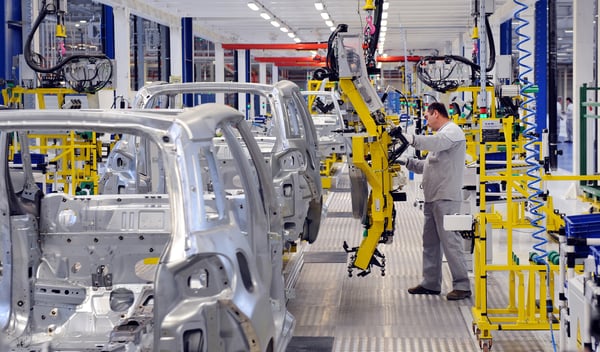 The COVID-19 pandemic has amplified the importance of hygiene and safety, and many workplaces are having to re-evaluate the way in which operations are conducted and that systems and structures are relooked at to ensure that their workers, employees, partners and visitors are well-protected.
The COVID-19 pandemic has amplified the importance of hygiene and safety, and many workplaces are having to re-evaluate the way in which operations are conducted and that systems and structures are relooked at to ensure that their workers, employees, partners and visitors are well-protected.
The IATF 16949-certified quality management systems in the automotive industry are no different. Now, there is a need to abide by a different set of rules and regulations to ensure that potential COVID-19 restrictions and risks are accounted for.
Some of the key questions that companies and businesses need to consider are:
- Under what conditions can corporate audits and certifications be conducted?
- What is the best way to minimize personal contact and physical interactions between employees while maximising safety for the interactions that are absolutely necessary?
- Is there a contactless way of conducting operations?
Extended Deadlines for Certification Renewals and Risk Assessments
Fortunately, in consideration of the difficult and stressful times of the pandemic, the IATF has approved a global extension to all currently issued and valid IATF 16949 certificates. This is to prevent the automatic expiration of certificates if a re-certification audit could not be conducted due to reasons directly related to the COVID-19 pandemic.
In cases where the required surveillance audit cannot be conducted within the allowable intervals and timing as per the IATF Rules, 5th Edition (Table 5.1: Surveillance interval), the IATF is granting an additional extension of ninety (90) calendar days to commence with the surveillance audit without initiating the decertification process. This is referred to as the “1st 90-day extension”
When this additional timing cannot be met, the decertification process shall be initiated in accordance with IATF Rules 5th Edition, section 8.1 e). This leads to an additional 90-day extension referred to as the “2nd 90-day extension”. During the second 90-day extension, while the certificate will be suspended, it will still retain its validity.
This extension period of 180 days allows companies more time and leeway to arrange for a regular surveillance audit conducted by their usual inspection company partners. Or, alternatively, they can also arrange for remote auditing, our answer to COVID-19 – a remote method of risk analysis, outlined by fixed criteria that is an alternative to on-site audits.
However, there are certain pre-requisites that companies must meet if they do wish to opt for remote auditing. It must be demonstrated evidently that a regular onsite audit will not be possible for reasons that are directly linked to the COVID-19 pandemic. Remote audits are applicable for initial audits, surveillance, recertification, transfer and special audits.
Remote Auditing: What happens and how manufacturers can prepare themselves
Instead of personally visiting the site to conduct the audit, the auditor now uses digital technology to connect to the company remotely. Some of these methods include livestreaming technologies and platforms such as Skype for Business, Webex, or Zoom, livestreaming through a combination of mobile apps on a smart device, or livestreaming through a combination of smart glass technology and video headsets.
During these virtual meetings, the necessary documents will be exchanged between parties in real-time, and interviews will also be conducted with various employees and workers as part of the observation process of how daily operations and productions are conducted in the workplace. To ensure that this process runs smoothly with minimal technical errors and delays, all pre-requisite technological setups and information exchange will be conducted alongside an internet connection test before the day of the remote audit.
Additionally, due to the rapidly increasing demands for remote audits, the certification body will identify risks that may negatively affect the progress and effectiveness of the audit beforehand and find ways to troubleshoot these risks to ensure that the process is seamless. To support that, the certification body may request the necessary information about management and production processes, site descriptions, equipment details, floor plans, and technical datasheets. All this information will support the certification body on determining the extent of the remote audit and plan accordingly.
Remote audits are also useful and efficient for companies that have several sites in different geographical locations. For these companies, the feasibility and extent of remote audits will be determined by the certification body beforehand after a consultation session and a thorough risk analysis.
Remote audits give companies the opportunity to save on time and money as physical on-site appointments tend to be costly. Having remote audits speed up auditing processes while reducing any additional physical work. TÜV Rheinland has developed special guidelines on conducting corporate audits while taking maximum safety precautions to ensure that it is able to perform surveillance audits, including on-site inspections, smoothly and safely. Protecting customers and employees is our top priority.
TÜV Rheinland is an official IATF-contracted and registered Certification Body. This ensures that your certification with us is conducted with the highest degree of professionalism and conformance to international guidelines and standards. Our vast, international network of experienced and independent experts will accompany you throughout the certification process and help you set up an efficient quality management system. You will gain the confidence of automotive manufacturers.
Does your company need to renew its IATF 16949 certification?
Speak to us today
Contact us for further information!


